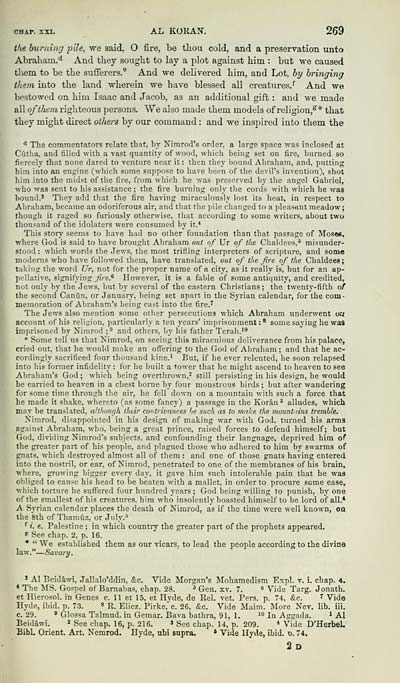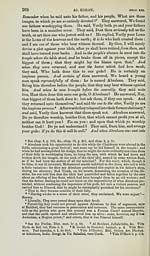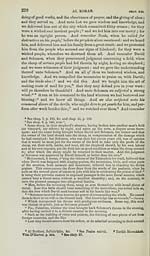Download files
Complete book:
Individual page:
Thumbnail gallery: Grid view | List view

CHAP. xxi. AL KOKAN. 269
the burning pile, we said, fire, be tliou cold, and a preservation unto
Abraliam.'* And they sotiglit to lay a plot against him : but we caused
tli-em to be the sufferers.® And we delivered him, and Lot, hj bringing
them into the land wherein we have blessed all creatures/ And we
bestowed on him Isaac and Jacob, as an additional gift : and we made
all of them rigliteous persons. We also made them models of religion,^* that
they might direct others by our command : and we inspired into them the
^ The commentators relate that, by Nimrod's order, a large space was inclosed at
Cutha, and filled with a vast quantity of wood, which being set on fire, burned so
fiercely that none dared to venture near it : then they i)ound Abraham, and, putting
him into an engine (which some suppose to have bei-n of the devil's invention), shot
him into the midst of the fire, from which he was preserved by the angel Gabriel,
who was sent to his assistance ; the fire burning only the cords with which he was
bound.' They add that the fire having miraculously lost its heat, in respect to
Abraham, became an odoriferous air, and that the pile changed to a pleas«nt meadow;
though it raged so furiously otherwise, that according to some writers, about two
thousand of the idolaters were consumed by it.*
This story seems to have had no other foundation than that passage of Mosm,
where God is said to have brought Abraham out of Ur of the Chaldees,* misunder-
stood: which words the Jews, the most trifling interpreters of scripture, and some
moderns who have followed them, have translated, out of tlie fire of the Chaldees;
taking the word Ur. not for the proper name of a city, as it really is, but for an ap-
pellative, signifying fire.^ However, it is a fable of some antiquity, and credited,
not only by the Jews, but by several of the eastern Christians ; the twenty-fifth of
the second Canun, or January, being set apart in the Syrian calendar, for the com-
memoration of Abraham's being cast into the fire.^
The Jews also mention some other persecutions which Abraham underwent ou
account of his religion, particularly a ten years' imprisonment;® some saying he was
imprisoned by Nimrod \^ and others, by his father Terah."*
« Some tell us that Nimrod, on seeing this miraculous deliverance from his palace,
cried out, that he would make an offering to the God of Abraham; and that he ac-
cordingly sacrificed four thousand kine.^ But, if he ever relented, he soon relapsed
into his 'former infidelity: for he built a tower that he might ascend to heaven to see
Abraham's God ; which being overthrown,' still persisting in his design, he would
be carried to heaven in a chest borne by four monstrous birds ; but after wandering
for some time through the air, he fell down on a mountain with such a force that
he made it shake, whereto (as some fancy) a passage in the Koran* alludes, which
may be translated, ahJmvgh thdr contrivances he such as to make the mountains tremble.
Nimrod, disappointed in his design of making war with God. turned his arras
against Abraham, who. being a great prince, raised forces to defend himself; but
God, dividing Nimrod's subjects, and confounding their language, deprived him of
the greater part of his people, and plafrued those who adhered to him by swarms of
gnats, which destroyed almost all of them : and one of those gnats having entered
into the nostril, or ear, of Nimrod, penetrated to one of the membranes of his brain,
where, growing bigger every day, it gave him such intolerable pain that he was
obliged to cause his head to be beaten with a mallet, in order to procure some ease,
which torture he suftered four hundred years; God being willing to punish, by one
of the smallest of his creatures, him who insolently boasted himself to be lord of all.*
A Svrian calendar places the death of Nimrod, as if the time were well known, on
the 8th of Thamuz, or July.*
^ i. e. Palestine ; in which countiy the greater part of the prophets appeared.
^ See chap. 2, p. 16.
■* "We established them as our vicars, to lead the people according to the divine
law." — Savary.
' Al Beidawi, Jallalo'ddin, &c. Vide Morgan's Mohamedism Expl. v. i. chap. 4.
* The IMS. Gospel of Barnabas, chap. 28. * Gen. xv. 7. « Vide Targ. Jonath.
et Hierosol. in Genes c. 11 et 15. et Hvde, de Rel. vet. Pers. p. 74, &c. ^ Vide
Hyde, ibid. p. 73. « r EUg^ Pirke."c. 26, &c. Vide Maim. More Nev. lib. iii.
c. 29. » Glossa Talmud, in Gemar. Bava bathra, 91, 1. i" In Atrgada. ^ Al
Beidawi. » See chap. 16, p. 216. » See chap. 14, p. 209. * Vide D'HerbeU
Bibl. Orient. Art. Nemrod. Hyde, ubi supra. * Vide Hyde, ibid. v. 74.
2d
the burning pile, we said, fire, be tliou cold, and a preservation unto
Abraliam.'* And they sotiglit to lay a plot against him : but we caused
tli-em to be the sufferers.® And we delivered him, and Lot, hj bringing
them into the land wherein we have blessed all creatures/ And we
bestowed on him Isaac and Jacob, as an additional gift : and we made
all of them rigliteous persons. We also made them models of religion,^* that
they might direct others by our command : and we inspired into them the
^ The commentators relate that, by Nimrod's order, a large space was inclosed at
Cutha, and filled with a vast quantity of wood, which being set on fire, burned so
fiercely that none dared to venture near it : then they i)ound Abraham, and, putting
him into an engine (which some suppose to have bei-n of the devil's invention), shot
him into the midst of the fire, from which he was preserved by the angel Gabriel,
who was sent to his assistance ; the fire burning only the cords with which he was
bound.' They add that the fire having miraculously lost its heat, in respect to
Abraham, became an odoriferous air, and that the pile changed to a pleas«nt meadow;
though it raged so furiously otherwise, that according to some writers, about two
thousand of the idolaters were consumed by it.*
This story seems to have had no other foundation than that passage of Mosm,
where God is said to have brought Abraham out of Ur of the Chaldees,* misunder-
stood: which words the Jews, the most trifling interpreters of scripture, and some
moderns who have followed them, have translated, out of tlie fire of the Chaldees;
taking the word Ur. not for the proper name of a city, as it really is, but for an ap-
pellative, signifying fire.^ However, it is a fable of some antiquity, and credited,
not only by the Jews, but by several of the eastern Christians ; the twenty-fifth of
the second Canun, or January, being set apart in the Syrian calendar, for the com-
memoration of Abraham's being cast into the fire.^
The Jews also mention some other persecutions which Abraham underwent ou
account of his religion, particularly a ten years' imprisonment;® some saying he was
imprisoned by Nimrod \^ and others, by his father Terah."*
« Some tell us that Nimrod, on seeing this miraculous deliverance from his palace,
cried out, that he would make an offering to the God of Abraham; and that he ac-
cordingly sacrificed four thousand kine.^ But, if he ever relented, he soon relapsed
into his 'former infidelity: for he built a tower that he might ascend to heaven to see
Abraham's God ; which being overthrown,' still persisting in his design, he would
be carried to heaven in a chest borne by four monstrous birds ; but after wandering
for some time through the air, he fell down on a mountain with such a force that
he made it shake, whereto (as some fancy) a passage in the Koran* alludes, which
may be translated, ahJmvgh thdr contrivances he such as to make the mountains tremble.
Nimrod, disappointed in his design of making war with God. turned his arras
against Abraham, who. being a great prince, raised forces to defend himself; but
God, dividing Nimrod's subjects, and confounding their language, deprived him of
the greater part of his people, and plafrued those who adhered to him by swarms of
gnats, which destroyed almost all of them : and one of those gnats having entered
into the nostril, or ear, of Nimrod, penetrated to one of the membranes of his brain,
where, growing bigger every day, it gave him such intolerable pain that he was
obliged to cause his head to be beaten with a mallet, in order to procure some ease,
which torture he suftered four hundred years; God being willing to punish, by one
of the smallest of his creatures, him who insolently boasted himself to be lord of all.*
A Svrian calendar places the death of Nimrod, as if the time were well known, on
the 8th of Thamuz, or July.*
^ i. e. Palestine ; in which countiy the greater part of the prophets appeared.
^ See chap. 2, p. 16.
■* "We established them as our vicars, to lead the people according to the divine
law." — Savary.
' Al Beidawi, Jallalo'ddin, &c. Vide Morgan's Mohamedism Expl. v. i. chap. 4.
* The IMS. Gospel of Barnabas, chap. 28. * Gen. xv. 7. « Vide Targ. Jonath.
et Hierosol. in Genes c. 11 et 15. et Hvde, de Rel. vet. Pers. p. 74, &c. ^ Vide
Hyde, ibid. p. 73. « r EUg^ Pirke."c. 26, &c. Vide Maim. More Nev. lib. iii.
c. 29. » Glossa Talmud, in Gemar. Bava bathra, 91, 1. i" In Atrgada. ^ Al
Beidawi. » See chap. 16, p. 216. » See chap. 14, p. 209. * Vide D'HerbeU
Bibl. Orient. Art. Nemrod. Hyde, ubi supra. * Vide Hyde, ibid. v. 74.
2d
Set display mode to: Large image | Transcription
Images and transcriptions on this page, including medium image downloads, may be used under the Creative Commons Attribution 4.0 International Licence unless otherwise stated. ![]()
| Early Gaelic Book Collections > J. F. Campbell Collection > Koran: or, Alcoran of Mohammed > (423) |
|---|
| Permanent URL | https://digital.nls.uk/77138748 |
|---|
| Description | Volumes from a collection of 610 books rich in Highland folklore, Ossianic literature and other Celtic subjects. Many of the books annotated by John Francis Campbell of Islay, who assembled the collection. |
|---|
| Description | Selected items from five 'Special and Named Printed Collections'. Includes books in Gaelic and other Celtic languages, works about the Gaels, their languages, literature, culture and history. |
|---|

